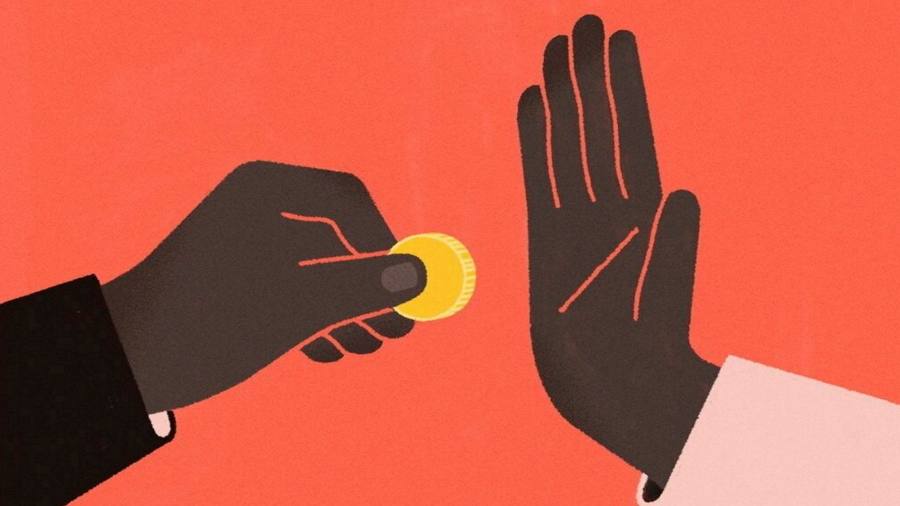
It’s not often you can relish the failure of a business venture, but the quiet evaporation of the Tip Project offers just such a joy.
The project, hatched from the gnarled nest of mid-pandemic bad ideas, was that it might somehow be good for Japan to start tipping — a pernicious psychosis that the East Asian country has watched consume the United States and which it has itself spent many happy decades avoiding.
By initially introducing a system of broadly-accepted, fixed-sum tipping vouchers, ran the pitch of Tip Project founder and motivational guru Yoshihito Kamogashira in early 2021, the lot of miserable pandemic-stricken restaurant workers might be somewhat improved.
The implied aim of Kamogashira’s so-called Tip Promotion Association was to wean Japan on to the broader, western habit of arbitrary cash disbursement to a select cabal of professions (cloakroom attendants, taxi drivers and hairdressers but never flight attendants, bus drivers or hair transplanters). The scheme, however serious it may or may not have been, appears to have fizzled out, the site and association no longer seem to exist and nobody is taking questions on the subject.
Asia generally lives in cherished freedom from the extreme, US-style tyranny of tipping and from the cloying calculus of guilt and pressure that underwrites it. Japan’s economy is not without the capacity for hidden costs to consumers, but has been a particularly stalwart defender of that liberty. Its resistance at this juncture is a timely triumph of sanity and fortitude. And possibly stinginess.
Intriguingly, notes a 2020 academic paper by Ofer Azar on the economics of tipping, the US was once teetering deliciously on Japan’s side of the gratuity jar. In the late 19th century, the prominent economist and trade unionist George Gunton argued that the whole practice of tipping was disgustingly un-American, running as it did against the proud spirit of working for wages rather than “fawning for favours”. Persuaded, some US states even passed laws against tipping in the early 1900s — before the country flipped and decided that tipping was definitely an all-American activity.
A little over a century later, tipping culture in the US is an implacable monster which, according to Azar and others, commands tens of billions of dollars in the food and drink industry alone, where it often represents the bulk of workers’ remuneration. It is also expanding with inflation, and, like fraud and romance, has successfully piggybacked on technology as a vector for its next phase of evolution.
As digital payments have come to dominate points of sale in the US, the option and expectation to tip has oozed into businesses that weren’t previously affected (florists, grocers). This has been significantly advanced by presenting customers with a choice between two buttons — one that offers a default 10-20 per cent tip on a given payment, the other providing an immediately guilt-inducing “no tip” option.
The interesting feature of tipping, argues Azar, is that it is extremely difficult to explain from the perspective of a purely self-interested consumer. An expectation of better future service is not, in most cases, the motive, which leaves psychological and social pressure a more plausible driver. Until there exists a social norm to tip a particular type of worker, or a known narrative about their conditions (for example, that waiters survive on tips), there is no guilt or embarrassment in not tipping.
There are many theories on how those psychological and social pressures combine to create (or permanently suppress) a tipping culture, but the owner of one Japanese restaurant chain privately frames it as an index of varying faith in capitalism. For all their superficial faith in its powers, he says, Americans tip because they know very well that their version of capitalism does not, without supplement, deliver a fair reward for service across the spectrum of industries. Japan, he suggests with obvious mischief, believes that its version fundamentally does.
If he is right, then faith on the Japanese side (and the refusal to embrace tipping) has endured an extreme and protracted test — decades of stagnant wages offset only by an accompanying battle with deflation. The test could, in theory, become more stern. Inflation in Japan is now palpable, and despite the success of workers in large companies securing historic pay increases this year, the win is unlikely to be replicated across Japan’s vast economic hinterland of small and medium-sized enterprises, which could widen pay disparity.
None of this, though, appears likely to sway the debate. Gunton may not have won the argument that tipping is un-American, but the Tip Project definitely discovered that it is un-Japanese.

